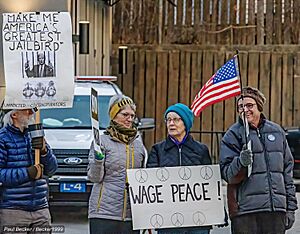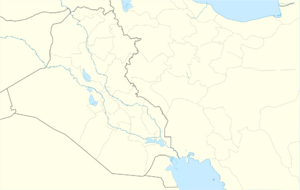Operation Martyr Soleimani facts for kids
Quick facts for kids Operation Martyr Soleimani |
|
|---|---|
| Part of events that followed the assassination of Qasem Soleimani during the 2019–2021 Persian Gulf crisis | |

Damage (encircled) to at least five structures at Ayn al-Asad airbase in a series of missile attacks by Iran
|
|
| Operational scope | Military strike targeting multiple sites |
| Location | Al-Asad Airbase, Al Anbar Governorate, Iraq 33°48′N 42°26′E / 33.800°N 42.433°E |
| Planned by | |
| Target | Al-Asad Airbase Erbil Airbase |
| Date | 8 January 2020, from about 1:30 a.m. to 4:00 a.m. (UTC+03:00) |
| Executed by | |
| Outcome | 11 Qiam 1 missiles hit Al-Asad Airbase |
| Casualties | |
On 8 January 2020, in a military operation code named Operation Martyr Soleimani (Persian: عملیات شهید سلیمانی), Iran's Islamic Revolutionary Guard Corps (IRGC) launched over 12 ballistic missiles at the al-Asad Airbase in Al Anbar Governorate, western Iraq, as well as another airbase in Erbil, in response to the assassination of Major General Qasem Soleimani by a United States drone strike.
The strike was the largest ballistic missile attack ever against U.S. forces abroad. Initially, the U.S. was not willing to concede the seriousness of the attack. While it initially assessed that none of its service members were injured or killed, the U.S. Department of Defense ultimately said that 110 service members had been diagnosed and treated for traumatic brain injuries (mainly concussions) from the attack. Some of them were later awarded the Purple Heart.
Iran reportedly informed the Iraqi government of an imminent attack shortly beforehand. The United States Secretary of State Mike Pompeo said the attack was intended to kill, however some analysts suggested the strike was deliberately designed to avoid causing any fatalities in order to dissuade an armed American response. The U.S. said it was able to avoid fatalities because the United States Space Force provided early warning.
In the months following the attack, the U.S. deployed Patriot and other missile defense systems to some of their Iraqi bases.
Contents
Reactions
Iran
In a letter to the United Nations, Iran called the missile strikes a "measured and proportionate" act of "self-defense" that "was precise and targeted military objectives thus leaving no collateral damage to civilians and civilian assets in the area." IRGC aerospace commander Amir Hajizadeh later stated that, if the U.S. had retaliated militarily, Iran was prepared to fire thousands of missiles during the escalation.
Iran's foreign minister Javad Zarif defended the legality of the attack, tweeting "Iran took & concluded proportionate measures in self-defense under Article 51 of UN Charter targeting base from which cowardly armed attack against our citizens & senior officials were launched." Zarif also tweeted "We do not seek escalation or war, but will defend ourselves against any aggression." He later said "it is up to the United States to now come to its senses and stop its adventurism in this region".
On 8 January, Ali Khamenei, the Supreme Leader of Iran, said military actions are not enough and that the "corruptive presence" of the U.S. in the Middle East must be ended. Khamenei also described the attacks as a "slap in the face" to the U.S. Khamenei later reiterated this during a Friday sermon on 17 January, describing the attack as showing that "Iran has the power to give such a slap to a world power shows the hand of God".
President Hassan Rouhani said "real revenge and the ultimate response by regional nations is when America is expelled from this region and its hand of aggression is cut off forever."
Iran's ambassador to the UN, Majid Takht-Ravanchi, said on 10 January that Iran intended to "send a message" with the missile strike.
Iraq
Iraqi Prime Minister Adil Abdul-Mahdi called for de-escalation and respect of Iraq's sovereignty.
Shortly after U.S. President Donald Trump's de-escalatory remarks regarding the attack, Iraqi cleric Muqtada al-Sadr urged his followers not to conduct any attacks against U.S. elements in Iraq. Sayyid Ali al-Sistani also called for ceasefire on both sides, saying the conflict violated Iraqi sovereignty.
Despite the calls for de-escalation, Reuters reported that three Katyusha rockets were launched on the evening of 8 January in Baghdad by unidentified militants, hitting the Green Zone. On 12 January, at least four Iraqi soldiers were injured after seven mortars attacked an airbase in Baghdad that housed U.S. trainers.
United States

U.S. Secretary of State Mike Pompeo condemned the Iranian ballistic missile strike.
Both Democratic and Republican members of the Senate advised the Trump administration to deescalate its stance with Iran. Senate majority leader Mitch McConnell said, "I believe the President wants to avoid conflict or needless loss of life but he's rightly prepared to protect American lives and interests and I hope Iran's leaders do not miscalculate by questioning our collective will in launching further attacks." House Speaker Nancy Pelosi announced a vote on a war powers resolution that would limit President Trump's military actions regarding Iran.
Senator Lindsey Graham called the missile strike "an act of war" and threatened to take Iran "out of the oil business".
In May 2020, 29 U.S. soldiers injured in the attack were awarded the Purple Heart. In December 2021, 39 additional soldiers were awarded the Purple Heart.
International
 United Nations's Secretary-General Antonio Guterres appealed for de-escalation and peace.
United Nations's Secretary-General Antonio Guterres appealed for de-escalation and peace. European Union leaders urged President Trump, both in public and in private, not to give a military response.
European Union leaders urged President Trump, both in public and in private, not to give a military response. United Kingdom: British prime minister Boris Johnson denounced the missile attacks on U.S. forces, urging Iran to avoid further "reckless and dangerous" strikes.
United Kingdom: British prime minister Boris Johnson denounced the missile attacks on U.S. forces, urging Iran to avoid further "reckless and dangerous" strikes. Saudi Arabia's deputy defense minister Prince Khalid bin Salman said the kingdom would stand with Iraq and do everything in its power to spare it from the "danger of war and conflict between external parties".
Saudi Arabia's deputy defense minister Prince Khalid bin Salman said the kingdom would stand with Iraq and do everything in its power to spare it from the "danger of war and conflict between external parties". Turkey's president Recep Tayyip Erdoğan said during the inauguration of the TurkStream gas pipeline alongside Russian president Vladimir Putin, that "no one has the right to throw the whole region, especially Iraq, into a new ring of fire for the sake of their own interests." He added "the tension between our ally U.S.A. and our neighbor Iran has reached a point that we do not desire at all," while promoting Turkey's diplomatic efforts to defuse the crisis.
Turkey's president Recep Tayyip Erdoğan said during the inauguration of the TurkStream gas pipeline alongside Russian president Vladimir Putin, that "no one has the right to throw the whole region, especially Iraq, into a new ring of fire for the sake of their own interests." He added "the tension between our ally U.S.A. and our neighbor Iran has reached a point that we do not desire at all," while promoting Turkey's diplomatic efforts to defuse the crisis. Qatar's emir, Sheikh Tamim bin Hamad Al Thani, visited Tehran to discuss the crisis with Iranian president Hassan Rouhani. The Qatari leader said de-escalation and dialogue were the only means to resolve the crisis and maintain peace. Sheikh Tamim was the first national leader to visit Iran following the death of General Soleimani.
Qatar's emir, Sheikh Tamim bin Hamad Al Thani, visited Tehran to discuss the crisis with Iranian president Hassan Rouhani. The Qatari leader said de-escalation and dialogue were the only means to resolve the crisis and maintain peace. Sheikh Tamim was the first national leader to visit Iran following the death of General Soleimani.
See also
- 2021 Erbil rocket attacks
- 2020 Camp Taji attacks
- Withdrawal of United States troops from Iraq (2020–2021)
- 2020 in Iraq
- 2020 in Iran


